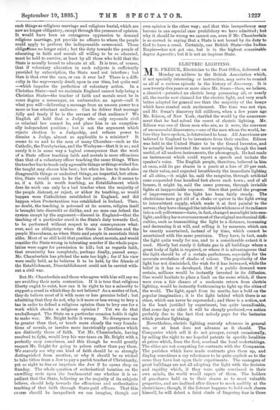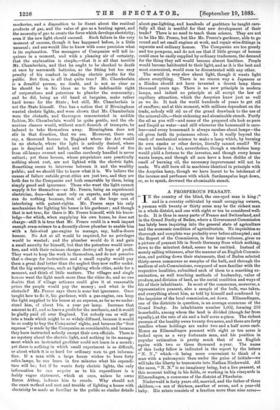ELECTRIC LIGHTING.
MR. PREECE, Electrician to the Post Office, delivered ol Monday an address to the British Association which, if not specially interesting or instructive, may serve to remind us all of a curious episode in the history of discovery. It is now twenty-five years or more since Mr. Swan—then, we believe, a chemist—patented an electric lamp possessing all, or nearly all, the merits now claimed for the electric light, and very pinch better adapted for general use than the majority of the lamps which have created such excitement. The time was not ripe, and Mr. Swan's discovery fell stillborn, when a few years ago Mr. Edison, of New York, startled the world by the announce- ment that he had solved the secret of electric lighting. Mr. Edison was one of those men who are, as it were, the converse of unsuccessful discoverers,—one of the men whom the world, be- fore they have spoken, is determined to hear. All Americana are believed in England to be inventors from their cradles. Edison was held in the United States to be the Grand Inventor, and he actually had invented the most surprising, though the least useful, of all modern instruments, the phonograph. He had made an instrument which could report a speech and imitate the speaker's voice. The English people, therefore, believed in him at once, sold its gas shares in a panic at a loss of 20 per cent. on their value, and expected breathlessly the immediate lightiag of all cities,—it might be, said the sanguine, through artificial suns suspended four hundred feet above each town ; and of all houses, it might be, said the same persons, through invisible lights at inappreciable expense. Since that period the progress of improvement in the light has been fairly steady. The electricians have got rid of a shake or quiver in the light owing to intermittent supply, which made it at first painful to the nerves ; they have changed the intolerable whiteness of its radiance into a soft yellowness—have, in fact, changed moonlight into sun.- light; and they have overcome most of the original mechanical dill& culties, such as transmitting the light to a distance, increasing and decreasing it at will, and selling it by measure, which can be exactly ascertained, instead of by time, which cannot be ascertained with the same precision. They have, in fact, made the light quite ready for use, and to a considerable extent it is used. Slowly but Barely it defeats gas in all buildings where a great body of light is required, or where it is advantageous that the light should be of a certain perfectness, especially for the accurate revelation of shades of colour. The popularity of the light has not diminished, the wish for it has increased, while the belief in it has so developed, that if a public demand were certain, millions would be instantly invested in its diffusion. One would hesitate to place a limit on the sums which, if there were even a fair chance of a moderate return from electric lighting, would be instantly forthcoming to light up the cities of the world. The light, apart from its merits, has a hold on the popular imagination; it is the light behind which there is no other, which can never be superseded ; and there is a notion, not in the least justified by experiment, but quite ineradicable, that some day or other it will be cheaply produced,—a notion probably due to the fact that nobody pays for the batteries which produce lightning.
Nevertheless, electric lighting scarcely advances in general use, or at least does not advance as it should. The Companies which sell it do not prosper, except occasionally, by selling the right to use hopeful patents in specific localities at prices which, from the first, overload the local undertakings. The cities are not competing for contracts with the Companies. The parishes which have made contracts give them up, and display sometimes a coy reluctance to be quite explicit as to the sums they have lost upon their experiments. The managers of great buildings are not all adopting the light with the decision and rapidity which, if they were quite convinced in their own minds, the world would expect of them. The holders of gas-shares hold on to their shares as to most valuable properties, and are inclined after dinner to mock audibly at the electricians ; though, if the listener happens to hold such shares himself, he will detect a faint shade of lingering fear in those mockeries, and a disposition to be fluent about the residual products of gas, and the value of gas as a heating agent, and the necessity of gas to create the force which develops electricity, even if the new light should succeed. Such failure in the very moment of success, though it has happened before, is a little unusual; and one would like to know with some precision what in its explanation. The managers of Companies will tell in- quirers in a moment, and with a pleasing air of certainty, that the explanation is simple,—that it is all that terrible Mr. Chamberlain, and that he ought to be shocked to death at once by mammoth batteries, as the fitting but too easy penalty of his conduct in stealing electric profits for the public. But then, is all that quite true? Mr. Chamberlain is a dreadful person, no doubt, and is not as clear as he should be in his ideas as to the indefeasible right of corporations and patentees to plunder the community ; and he did, being an old hand at bargains, make rather hard terms for the State ; but still, Mr. Chamberlain is not the State himself. One has a notion that if Birmingham wanted electric lights, and were shown that Mr. Chamberlain were the obstacle, and thereupon remonstrated in audible fashion, Mr. Chamberlain would be quite gentle, and the ob- noxious clauses would, without much flourish of trumpets, be induced to take themselves away. Birmingham does not stir in that direction, that we see. Moreover, there are, say, a thousand houses in England where the Act would be no obstacle, where the light is ardently desired, where gas is despised. and hated, and. where the dread of fire from oil-lamps overset and candles carelessly handled is never extinct; yet these houses, whose proprietors care practically nothing about cost, are not lighted with the electric light. Something seems to intervene between it and the wealthy public; and we should like to know what it is. We believe the causes of failure outside great cities are just two, and they are both due to the Companies and both removable by them, being simply greed. and ignorance. Those who want the light cannot supply it for themselves—as Mr. Preece, being an experienced electrician, does—but must rely on experts, and the experts can do nothing because, first of all, of the huge cost of interfering with patent-rights. Mr. Preece says his only mechanician for lighting his house is his gardener ; and though that is not true, for there is Mr. Preece himself, with his know- ledge—for which, when supplying his own house, he does not charge—still it is tame that Mr. Preece could in a week impart enough cram-science to a decently clever plumber to enable him with a fair-sized gas-engine to manage, say, half-a-dozen houses. No Act at all would be required, for no privileges would be wanted; and the plumber would do it and gain a small annuity for himself, but that the patentees would inter- fere, and with their ruinous charges destroy all hope of profit. They want to keep the work to themselves, and do not perceive that a charge for instruction and a small royalty would pay them a great deal better than the neglect they now suffer under. Set the big enterprises, such as lighting whole cities, aside for a moment, and think of little matters. The villages and. single houses want the light much more than the cities do, and no one doubts that if village artisans could give it at reasonable prices the people would pay the money ; and what is the obstacle? Mr. Preece says there is none but ignorance. Once taught how to do it, his gardener, with a gas-engine, can keep the light supplied to his house at an expense, as far as we under- stand him, of about 16s. a year per lamp. Increase that amount to El, and. so leave a profit for the mechanic, and it would be gladly paid. all over England. Yet nobody can or will go into a trade which might be so widely diffused, because it would be so costly to buy the Companies' rights, and. because the "first expense" is made by the Companies so considerable, and because they have instructed. nobody except their own officials. There is no mystery about the electric light, and nothing in its manage- ment which an instructed gasfitter could not learn in a month ; yet there is nothing in which small experiment is so difficult, or about which it is so hard for ordinary men to get informa- tion. If a man with a large house wishes to burn forty colza-lamps, he can learn in five minutes what his expendi- ture will be; but if he wants forty electric lights, the only information he can acquire as to his expenditure is a feebly vague statement, which at once, unless he owns Eaton Abbey, induces him to recede. Why should not the exact method and cost and trouble of lighting a house with electricity be made as familiar to the public as similar details
about gas-lighting, and hundreds of gasfitters be taught care- fully all that is needful for that new development of their trade? There is no need to teach them science. They are not to be like Mr. Preece, but like Mr. Preece's gardener, able to go round and set small engines at work, and repair wire-fittings in separate and ordinary houses. The Companies are too greedy and too pompous, and do not see that if little groups of houses could once be easily supplied by ordinary tradesmen, the demand for the thing they sell would become almost limitless. People would become habituated to their light, and as it is the best and most convenient, would soon be discontented with any other.
The world is very slow about light, though it wants light above everything. There is no reason way a Japanese or a Hindoo should not have invented a decent lamp three thousand years ago. There is no new principle in modern lamps, and indeed no principle at all except the law of capillary attraction, which the Assyrian knew just as well as we do. It took the world hundreds of years to get rid of snuffers; and at this moment, with millions dependent on the trade, nobody will rid us of the grand drawback to the use of the mineral oils,—their sickening and abominable stench. Purify the oil as you will—and some of the prepared oils look as pure and limpid as water—and still whenever the housemaid is care- less—and every housemaid is always careless about lamps—the oil gives forth its poisonous odour. Is it really beyond the reach of mechanical science to make a lamp which, by burning its own smoke or other device, literally cannot smell? We do not believe it ; but, nevertheless, though a smokeless lamp would yield a fortune to the inventor, and though every house wants lamps, and though all men have a keen dislike of the smell of burning oil, the necessary improvement will not be made. We still burn oil in machines identical in principle with the Assyrian lamp, though we have learnt to be intolerant of the incense and perfumes with which Sardanapalus kept down, or, so to speak, drowned the abominable stench.



































 Previous page
Previous page